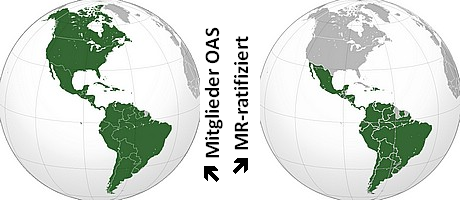(Latein-)Amerika: Interamerikanische Kommission für Menschenrechte eröffnet LGBTI-Abteilung

Nicht alle 35 Mitgliedstaaten der Organisation Amerikanerischer Staaten (OAS) haben die Menschenrechtsvereinbarung ratifiziert, und anerkennen somit den gemeinsamen Menschenrechts-Gerichtshof (auch ‚CIDH‘) nicht an. Abseits stehen etwa Belize, Guyana, Kanada, Kuba und die USA.
An ihrer 143 Session beschloss die Interamerikanische Kommission für Menschenrechte (CIDH), eine Kommission der Organisation Amerikanerischer Staaten, die Bildung einer LGBTI-Abteilung. Die Kommission hat Kenntnis von Morden, Vergewaltigungen, Drohungen. Darüberhinaus sind LGBT mit schweren Behinderungen konfrontiert, etwa im Zugang zum Arbeitsmarkt, zur Gesundheitsversorgungen, zu Gerichten und in der Teilnahme am politischen Leben.
Diese LGBTI-Abteilung soll im Sinne des strategischen Plans der kontinuierlichen und harmonsierten Entwicklung der Mitgliedstaaten (auch im Bereiche sozialer und kultureller Rechte) die Benachteiligungen von LGBTI angehen und in einem Jahr einen ersten Bericht vorlegen.
Amnesty International begrüsst die Bildung der Abteilung ausdrücklich und findet es auserordentlich positiv, dass die (latein-)amerikanischen Ländern selber und gemeinsam an der Verbesserung ihrer eigenen Menschenrechtssituation arbeiten.
Vgl auch: – Declaración de Lima 2010: Propuesta de Convención Interamericana de los Derechos Sexuales y los Derechos Reproductivos (PDF, Spanisch. 16 S., 530 kB, Quelle).
< ! ----------------------------------------------------------------------------------->
Medienmitteilung der CIDH
(Spanisch / Englisch)
< ! ----------------------------------------------------------------------------------->
| Comisión Interamericana de Derechos Humanos | Inter-American Commission on Human Rights |
| COMUNICADO DE PRENSA, No. 115/11 | PRESS RELEASE, N° 115/11 |
| CIDH CREA UNIDAD PARA LOS DERECHOS DE LAS LESBIANAS, LOS GAYS Y LAS PERSONAS TRANS, BISEXUALES E INTERSEXO | IACHR CREATES UNIT ON THE RIGHTS OF LESBIAN, GAY, BISEXUAL, TRANS, AND INTERSEX PERSONS |
| Washington, D.C., 3 de noviembre de 2011 – Durante el 143º Período de Sesiones, La Comisión Interamericana de Derechos Humanos (CIDH) decidió crear una Unidad para los derechos de las lesbianas, los gays y las personas trans, bisexuales e intersexo, a fin de aumentar su capacidad de proteger sus derechos. | Washington, D.C., November 3, 2011—During its 143rd regular session, the Inter-American Commission on Human Rights (IACHR) decided to create a Unit on the Rights of Lesbian, Gay, Bisexual, Trans, and Intersex (LGBTI) Persons, in order to strengthen its capacity to protect their rights. |
| En los últimos años la CIDH ha dado un especial seguimiento a la situación de los derechos de las personas LGTBI principalmente mediante medidas cautelares, audiencias, visitas a los países y actividades de promoción. La Comisión ha buscado proteger y promover sus derechos y ha constatado las graves violaciones que muchas de estas personas enfrentan en su vida diaria. | In recent years the IACHR has closely followed the situation of the rights of LGBTI persons, primarily through precautionary measures, hearings, country visits, and promotional activities. The Commission has sought to protect and promote their rights and has witnessed the serious human rights violations that many of these individuals face in their daily lives. |
| La Comisión ha comprobado la grave discriminación de hecho y de derecho que enfrentan las personas LGTBI en los países de la región. Entre otras violaciones, la CIDH ha recibido información sobre asesinatos, violaciones y amenazas de la cual son víctimas. Adicionalmente, las personas LGTBI enfrentan importantes barreras de acceso a la salud, el empleo, la justicia y la participación política. | The Commission has confirmed that LGBTI persons face serious discrimination, both in fact and in law, in the countries of the region. Among other violations, the IACHR has received information about murders, rapes, and threats to which LGBTI persons are victims. In addition, LGBTI persons face significant barriers in their access to health, employment, justice, and political participation. |
| La nueva Unidad es parte del enfoque integral adoptado por la CIDH a través de su Plan Estratégico, que promueve el desarrollo armónico de todas sus áreas de trabajo con base en la interdependencia e indivisibilidad de todos los derechos humanos, y la necesidad de proteger los derechos de todas las personas y grupos históricamente sometidas a discriminación. | The new Unit is part of the comprehensive approach the IACHR has adopted through its Strategic Plan, which promotes the harmonious development of all its work areas based on the interdependence and indivisibility of all human rights and the need to protect the rights of all individuals and groups historically subjected to discrimination. |
| El próximo año la Comisión evaluará el trabajo de la Unidad y la existencia de recursos suficientes que permitan la sustentabilidad de sus esfuerzos y el funcionamiento balanceado del Plan Estratégico y decidirá sobre la creación de una Relatoría sobre los derechos de las personas LGTBI. | Next year the Commission will evaluate the Unit’s work and whether sufficient resources exist to make its efforts sustainable, along with the overall functioning of its Strategic Plan, and will decide on whether to create an Office of the Rapporteur on the Rights of LGBTI Persons. |
| La CIDH es un órgano principal y autónomo de la Organización de los Estados Americanos (OEA), cuyo mandato surge de la Carta de la OEA y de la Convención Americana sobre Derechos Humanos. La Comisión Interamericana tiene el mandato de promover la observancia de los derechos humanos en la región y actúa como órgano consultivo de la OEA en la materia. La CIDH está integrada por siete miembros independientes que son elegidos por la Asamblea General de la OEA a título personal, y no representan sus países de origen o residencia. | A principal, autonomous body of the Organization of American States (OAS), the IACHR derives its mandate from the OAS Charter and the American Convention on Human Rights. The Inter-American Commission has a mandate to promote respect for human rights in the region and acts as a consultative body to the OAS in this matter. The Commission is composed of seven independent members who are elected in an individual capacity by the OAS General Assembly and who do not represent their countries of origin or residence. |
| Fuente | Source |

